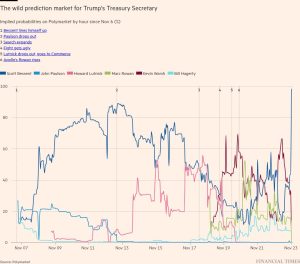Labour’s unambitious reset with the EU
Unlock the Editor’s Digest for free
Roula Khalaf, Editor of the FT, selects her favourite stories in this weekly newsletter.
Even as Britain’s Labour government wooed investors at a summit on Monday, David Lammy was lunching with European counterparts as the first post-Brexit foreign secretary to attend a regular meeting of EU foreign ministers. Earlier this month, Prime Minister Sir Keir Starmer met European Commission president Ursula von der Leyen to signal the formal start of a rapprochement, after summer trips to Berlin and Paris. The mood music has certainly improved and efforts at a reset with EU partners are welcome. The problem is that the reality, especially on economic ties, falls short of the photo-ops and the rhetoric.
Labour’s aims of a UK-EU security pact and closer defence and security ties with France and Germany can help to repair mutual confidence and the UK’s tattered international image. But the government’s apparent hope that co-operation on shared challenges such as security and climate change can bleed into improved access to the EU’s single market looks like wishful thinking. The EU is clear that the bare-bones Trade and Cooperation Agreement agreed by Boris Johnson’s government sets the framework for economic relations.
Starmer’s Labour manifesto said it would work to improve ties by “tearing down unnecessary barriers to trade”. But its three stated aims may prove undeliverable or of limited value. A veterinary agreement could reduce costs and border checks for the food industry. Even dynamic regulatory alignment — or automatically following EU rules — does not, however, provide access equivalent to being in the single market.
A deal to loosen curbs on touring musicians would require rule changes the EU already rejected when Rishi Sunak’s Conservative government made the same demand. And, as Canada has discovered, negotiating mutual recognition of professional qualifications with the EU as a third country is a tortuous process with modest rewards.
Labour’s limited ambitions despite its landslide election victory have caused disappointment in Brussels. The government, wary of the Euroscepticism in Labour heartlands, has hemmed itself in by adopting the same “red lines” that shaped Johnson’s EU deal: no return to the single market, the customs union, or freedom of movement.
There are areas, however, where the Starmer administration could go further without breaching its red lines. It should be more open to a youth mobility deal allowing 18- to 30-year-olds to work and travel. Labour has been cool on the idea, portraying it — inaccurately — as “synonymous” with freedom of movement and fearing it could undermine efforts to limit legal migration. A deal, though, could build goodwill with Brussels. Both sides would gain, too, from improving energy trading arrangements, to avoid deterring investment in turning the North Sea into a green energy “hub”.
Some economists say Britain could make worthwhile gains by going beyond a veterinary deal and adopting dynamic alignment in various sectors to revitalise post-Brexit trade in goods. The Resolution Foundation notes several EU neighbours have reduced trade frictions this way. A product safety bill the government launched last month opens the door to alignment with EU rules where beneficial.
Such “strategic” alignment, however, comes at the cost of giving up regulatory autonomy — which the Conservatives had touted as a key Brexit benefit, though doing little to exploit it. Some business leaders argue a nimbler, more innovation-friendly approach to regulating some areas could offset some of the damage done to Britain’s investment attractiveness by erecting barriers to its biggest market. If its EU red lines are immovable, rapidly and effectively navigating these post-Brexit trade-offs will be vital for Labour to get the most out of its reset — and to lessen one of the key impediments to future UK growth.
#Labours #unambitious #reset





